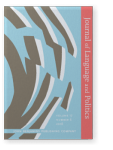Political rhetoric and discursive framing of national identity in Croatia’s commemorative culture
The topic of this paper is framing of collective, national identities in commemorative speeches. It identifies abstract conceptions of Croatian national identity articulated by political elites during commemorative practices and examines what patterns are used for their linguistic expression. The questions that are posed are how Croatian nation and national identity are framed in discourse and whether constructs of national identity are formed depending on the context and on the party political affiliation of the speaker. However, the aim is also to track potential changes in elite narratives over time. The analysis is based on a corpus of commemorative speeches delivered by Croatia’s political elites on the occasion of celebration of the Croatian army victory in a military operation. The main focus is on the conceptual and linguistic analysis of the collective identities and sociocultural concepts in the staged communication during commemoration rituals.
Article outline
- 1.Introduction
- 2.Methodology: The Discourse-historical approach and cultural approaches to critical discourse analysis
- 3.Nation, memory, and national identity
- 4.Case study: Annual celebration of operation ‘Storm’
- 4.1The frame of national historical statehood
- 4.2The frame of national unity
- 4.3The frame of national victory and victimization
- 4.4The frame of ‘Europeanization’ of national identity
- 5.Conclusion
- Notes
-
References
References
Barić, Nikica
2005 Srpska pobuna u Hrvatskoj 1990–1995. [
Serb rebellion in Croatia 1990–1995]. Zagreb: Golden Marketing – Tehnička knjiga.

Bellamy, Alex J.
2003 The Formation of Croatian National Identity: A Centuries-old Dream. Manchester: Manchester University Press.


Benford, Robert D. and Snow, David A.
2000 “
Framing Processes and Social Movements: An Overview and Assessment.”
Annual Review of Sociology 261: 611–639.


Chilton, Paul
2004 Analysing Political Discourse. Theory and Practice. London and New York: Routledge


Connerton, Paul
1989 How Societies Remember. Cambridge and New York and Melbourne: Cambridge University Press.


De Cillia, Rudolf, Reisigl, Martin and Wodak, Ruth
1999 “
The Discursive Construction of National Identities.”
Discourse and Society 10(2):149–170.


Entman, Robert M.
1993 “
Framing: Toward Clarification of a Fractured Paradigm.”
Journal of Communication 43(4): 51–58.


Fairclough, Norman
1995 Critical Discourse Analysis: The Critical Study of Language. London and New York: Longman.

Gavriely-Nuri, Dalia
2012 “
Cultural approach to CDA.”
Critical Discourse Studies 9(1):77–85.


Goffman, Erving
1974 Frame Analysis: An Essay on the Organization of Experience. New York, NY et al.: Harper & Row.

Kertzer, David I.
1988 Ritual, Politics and Power. New Haven and London: Yale University Press.

Krzyżanowski, Michaɬ
2009 “
On the ‘Europeanisation’ of Identity Constructions in Polish Political Discourse after 1989.” In
Discourse and Transformation in Central and Eastern Europe, ed. by
Aleksandra Galasińska and
Michaɬ Krzyżanowski, 95–113. Palgrave MacMillan.


Kukec, Tomislav
2012 “
Ivo Josipović: Trebamo pružiti ruku sugrađanima Srbima i pokloniti se i njihovim žrtvama.” [Ivo Josipović: We should reach out to Serb citizens and pay respects to their victims]
Jutarnji list,
August 6.

Kukec, Tomislav
2013 “
Milanovića izviždali branitelji.” [Milanović booed by defenders].
Jutarnji list,
August 6.

Lindekilde, Lasse
2014 “
Discourse and Frame Analysis: In-Depth Analysis of Qualitative Data in Social Movement Research.” In
Methodological Practices in Social Movement Research, ed. by
Donatella della Porta, 195–227. Oxford: Oxford University Press.


Misztal, Barbara A.
2003 Theories of Social Remembering. Maidenhead and Philadelphia: Open University Press.

Novi list
2006 “
Nastavljamo borbu za civiliziranu Hrvatsku.” [We are continuing the fight for a civilised Croatia],
August 4.

Reisigl, Martin
2008 “
Analyzing Political Rhetoric.” In
Qualititive Discourse Analysis in the Social Sciences, ed. by
Ruth Wodak and
Michaɬ Krzyżanowski, 96–120. Palgrave Macmillan.


Scollo, Michelle
2011 “
Cultural approaches to discourse analysis: A theoretical and methodological conversation with special focus on Donal Carbaugh’s Cultural Discourse Theory.”
Journal of Multicultural Discourses 6(1):1–32.


Smith, Anthony D.
1992 “
National Identity and the Idea of European Unity.”
International Affairs 68(1): 55–76.


Narodne novine
1990 Ustav Republike Hrvatske [Constitution of the Republic of Croatia]. no. 56/90.

Van Dijk, Teun A.
2001 “
Critical Discourse Analysis.” In
The Handbook of Discourse Analysis, ed. by
Deborah Schiffrin,
Deborah Tannen and
Heidi E. Hamilton, 352–371. Blackwell Publishing.

Vjesnik
2009 “
Proslava 5. kolovoza je i poziv na zajedništvo svih čimbenika u hrvatskom društvu.” [Celebration of August 4 is also an invitation to unity of all factors in the Croatian society],
August 6.

Weiss, Gilbert and Wodak, Ruth
(Eds.) 2003 Critical Discourse Analysis. Theory and Interdisciplinarity. Palgrave Macmillan.

Wodak, Ruth
2001 “
The Discourse Historical Approach.” In
Methods of Critical Discourse Analysis, ed. by
Ruth Wodak and
Michael Meyer, 64–94. London, Thousand Oaks, New Delhi: Sage Publications.

Wodak, Ruth and De Cillia, Rudolf
2007 “
Commemorating the Past: The Discursive Construction of Official Narratives about the ‘Rebirth of the Second Austrian Republic’.”
Discourse and Communication 1(3): 315–341.


Wodak, Ruth, De Cillia, Rudolf, Reisigl, Martin, and Liebhart Karin
2009 The Discursive Construction of National Identity. Edinburgh: Edinburgh University Press.

Žanić, Ivo
1996 “
Zvonimir na remontu. Politika kao pučka književnost.” [Zvonimir’s repair. Politics as popular literature],
Eramsus – Časopis za kulturu demokarcije 15(62): 56–62.

Žunec, Ozren
2007 Goli život: socijetalne dimenzije pobune Srba u Hrvatskoj [
Bare life: Societal dimensions of the Serbs’ rebellion in Croatia]. Zagreb: Demetra.

Cited by
Cited by 1 other publications
Bieber, Florian
2021.
The Past that Never Left? Nationalism, Historiography, and the Yugoslav Wars. In
National History and New Nationalism in the Twenty-First Century,
► pp. 190 ff.

This list is based on CrossRef data as of 19 april 2022. Please note that it may not be complete. Sources presented here have been supplied by the respective publishers.
Any errors therein should be reported to them.
